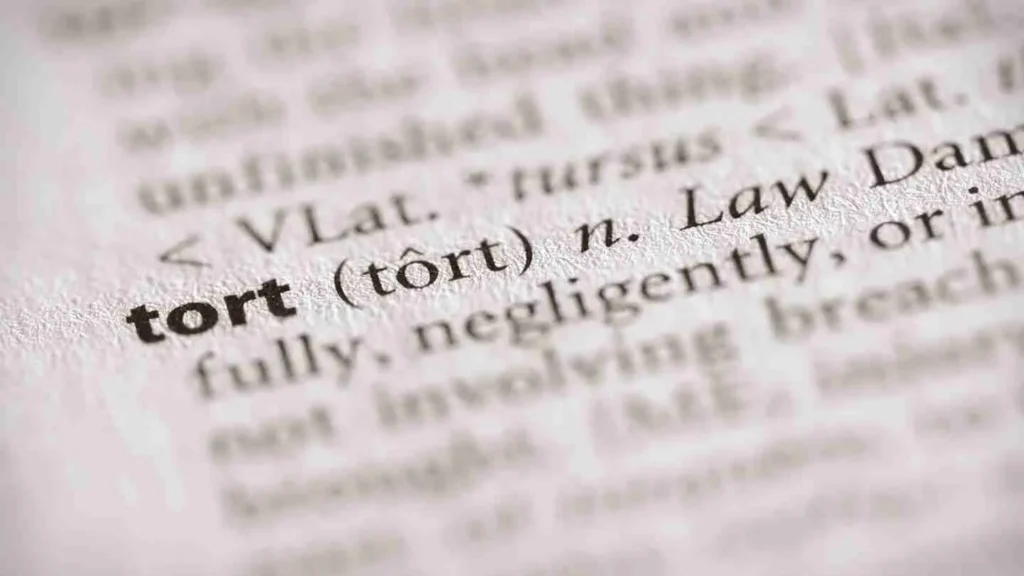Suppose you find yourself standing on the sidelines of an ongoing argument in your classroom. The fight between the students escalates.
Should you watch or intervene? Should you take your responsibility as a fellow human being and as a professional or look away? How do you best protect your career?
The Tort Law
When reality hits, it is not easy to know one’s rights and obligations as a teacher. In the heat of the moment, it can be quick to act with the option that you think is right for the moment. Of course, everyone should help a fellow human being, and you should always do this as a teacher.
But what will the consequences be for you?
We clarify rights and obligations, responsibilities and commitments, and how they can affect you both personally and financially in an emergency.
Tort law entails a duty of care, which constitutes the first of the three primary elements of tort. Duty of care, breach, and causation. Whilst there are many situations in which an individual might have acted carelessly, unless they have a duty of care to the person harmed by their carelessness, then no claim will arise.

The law recognizes torts as civil wrongs and allows injured parties to recover for their losses. Injured parties may bring suit to recover damages in the form of monetary compensation or for an injunction, which compels a party to cease an activity.
Remember This:
- Tort law is the branch of the law that deals with civil suits, with the exception of disputes involving contracts.
- Tort law is considered a form of restorative justice because it seeks to remedy losses or injuries by providing monetary compensation.
- There are three main categories of tort law, including suits alleging negligence, intentional harm, and strict liability.
The actual facts must be examined closely in any given case to determine whether all these elements are present.
There is no doubt that teachers owe a duty of care to students. However, there is no simple answer as to when this duty starts, where it ends, or precisely what constitutes a breach of duty.
There is a tort reform because of the critical stance taken against many tort cases, especially in the United States. Proponents of tort reform argue that many lawsuits today are frivolous.
Tort reform refers to changes to the law designed to make it harder for plaintiffs to sue or designed to reduce the potential compensation available after a lawsuit has been filed and won.
Protect Your Rights and Learn to Deal with Unpleasant Situations
You may also be exposed to threats, violence, or abuse by a student. How do you act then? And what do you actually get to do? These two questions can have completely different answers. Make sure to have the law on your side while protecting your rights and privacy. Avoid financial consequences by being well-informed about what applies to you in your professional role as a teacher.
When May Teachers Use Reasonable Force?
Believe me. It happens all too often that teachers step in when there is a fight and then lay a hand on the student to try to stop the tumult, and thus, they have to take the consequences for this themselves.
Suddenly, you have received a report for this. In the worst case, a lawsuit will ultimately cost you both your career and financial savings. But let us not go all the way to that. Be well-informed about your commitments, and if you still get a lawsuit on your back, find a good advisor or lawyer who can help you understand your rights and obligations. All to avoid big economic consequences or a suspended teaching license.
- Does a teacher have a responsibility to intervene in situations such as this in order to prevent further injury to students or themselves?
- When may a teacher use physical force to protect students?
Teachers’ Duty of Care
The general law of negligence provides that a person may be negligent if:
- They owe a duty of care to the person injured and
- They did not carry out that duty to the legal standard required and
- The person suffered damage as a result of the failure to observe the duty of care.
The following general principles apply:
- Teachers must take reasonable care to ensure that their students do not meet with foreseeable injury. They must protect the children against foreseeable risks of personal injury or harm.
- The standard of care is that of a reasonably careful parent. The degree of care depends on factors such as the age of the students.
- There must be an effective system of supervision in the school’s operation.
The duty of care applies while the students are on the school premises during school opening hours. It can also apply if the students are present outside of official school hours, for example, if they arrive early or leave late and the teacher or school has agreed to the students being present.
The same duty of care applies if a teacher voluntarily supervises children.
Teachers must follow good standards and approved practices. Risky classes and activities require a greater degree of supervision. If goggles, protective clothing, etc., are supplied for certain activities, the teacher must ensure that they are worn.
The teacher can be held individually liable for the student’s injuries and risks and awarded monetary damages in court. Tort law is based on the legal premise that individuals are liable for the consequences of their conduct (or lack of conduct) when such actions result in injury to others.
Negligence
The primary difference between tort law and negligence is that an intentional tort occurs when someone acts on purpose. In contrast, negligence happens when someone isn’t careful enough to fulfill the necessary standard of care.
Although teacher liability extends to intentional torts, such as assault and battery, most legal actions against teachers are brought under a theory of negligence. Negligence is often characterized as the “failure to exercise the standard of care that a reasonably prudent person would have exercised in a similar situation.” In the classroom context, negligence can be broken down into four elements:
1. Does the teacher owe a duty to the student?
2. Did the teacher breach that duty?
3. Was the teacher’s failure to fulfill her duty the cause of the student’s injury?
4. Did an injury occur? Under the first element, school officials owe students the duty to provide reasonable supervision and educational instruction and maintain an educational environment free of obvious dangers.
The teacher’s liability will generally hinge on whether he/she can anticipate foreseeable dangers under the circumstances. Although educators cannot guarantee student safety in all situations, they are required to foresee the possible consequences of their actions and take steps to provide a safe learning environment. If a teacher fails to anticipate a foreseeable risk and that failure causes an injury to a child, the teacher could be liable for damages.
Negligence Risks
No matter how great of a teacher you are, there are times you make mistakes. A mistake can range from something minor to something significant. If you forget to mark down a student’s name during the morning register, no one will act against you- an easy fix. On the other hand, if a student is injured during your supervision- this is a different story. You will be liable when (if) your negligence causes injuries, property damage, or even mental damage.
It is one of the most common teacher liability risks that can result in lawsuits, reputation damage, and sufficient financial loss. Incidents of negligence are more common when a teacher has a large group of students under their supervision and cannot provide full attention to every child. Unfortunately, a parent or a higher authority may not see it the same way you do.
For example, a teacher will be sued and held liable if there is a fight or bullying under their supervision. Mainly if the conflict or bullying results in serious injuries or mental harm. The teacher may be forced to pay legal costs to appeal and settlement costs. A negligence claim can result in awful reputation damage if not dealt with appropriately by experts.
False Allegation Risks
Another common teacher liability risk and worry every teacher faces is false allegations. Sadly, as some kids start to mature, they feel a sense of power and respect for authority diminishes. They feel they can spread rumors and false information about the teacher, but they don’t understand how the allegation can harm a teacher’s future and reputation.
In many cases, the allegations are serious issues that reach parents and high authority. Allegations can influence parents to act and sue the teacher without evidence. Unfortunately, most parents will blindly believe their child before they believe an adult teacher or investigate further.
For example, a student may claim a teacher physically abused them – resulting in serious legal actions. In fact, there are many cases like this where teachers have been fired from the school and arrested due to a false allegation.
Many schools have begun an open-door policy to try their best to avoid such false cases. In addition, teachers are advised never to close a door when with just 1 or 2 students unless a higher supervisor is present.
The Education Code
The Education Code recognizes that teachers and other certificated employees have a responsibility to intervene physically in order to protect students.
A teacher may use reasonable force to quell a disturbance, protect others, act in self-defense, or take possession of weapons.
Education Code section 44807 provides that Every teacher in the public schools shall hold pupils to a strict account for their conduct on the way to and from school, on the playgrounds, or during recess.
A teacher, vice principal, principal, or any other certificated employee of a school district shall not be subject to criminal prosecution or criminal penalties for the exercise, during the performance of his duties, of the same degree of physical control over a pupil that a parent would be legally privileged to exercise but which in no event shall exceed the amount of physical control reasonably necessary to maintain order, protect property, or protect the health and safety of pupils, or to maintain proper and appropriate conditions conducive to learning.
School May Not Protect Your Risk
Many teachers believe that the school or the education organization will protect them from teacher liability risks. Yes, in many cases, the school will help you and support you through the challenging lawsuit and provide clear evidence. However, there can also be instances where your school will put its reputation before its teachers.
A school may leave you alone and remove you from its brand image. After that, you will have to defend your liability case and fight for your reputation. At this point, you will have to find your legal team and evidence support to fight your case.
Insurance
The Board of Management is generally liable for the negligence of its teachers. That means that the school’s board is normally sued in such cases.
The school’s board is obliged to have comprehensive insurance cover for the school. This insurance must cover public liability, negligence by staff, or defects in the buildings. The insurance policy must be available for inspection.
Some parents take out insurance to cover their children against accidents at school that are not the school’s responsibility. Some schools encourage parents to do this, but it is entirely a matter of personal choice. General health services are available to children in the normal way if they suffer an injury at school.
- Common sense and good judgment will not always protect professional educators from placing themselves in a position of personal liability. Students may get injured while under teacher supervision, or parents may blame a teacher for damaging a student’s academic reputation. Even if you’re not held liable, your legal defense bills could be significant.
Luckily, several insurance companies offer affordable policies with robust protection for educators.
Important!
You might assume that the school district’s liability policy will cover you, but that’s not the case. Typically, you aren’t named in the school district’s policy, so school districts won’t pay for your legal defense if they’re sued.
What Is Teacher Liability Insurance?
Insurance for educators covers more than just injuries to students due to negligence. Students and parents have sued teachers in the past for giving bad grades, failing to intervene in bullying, and violating students’ free speech rights.
Teacher liability insurance is a group of coverages some providers offer as a single package. Depending on your classroom and the type of instruction you provide, you may need some coverages below and not others.
- General Liability Insurance
A commercial general liability policy will cover a teacher’s legal fees and judgments resulting from claims of bodily injury, emotional distress, or property damage due to non-professional negligent acts. It also covers personal and advertising injuries, such as wrongful invasion of privacy. It provides medical payment coverage if someone is injured while you are teaching, too.
- Professional Liability Insurance
Professional liability insurance protects you if a parent or student sues you for losses associated with several areas, including professional negligence and inaccurate advice.
- Business Personal Property Insurance
While general liability coverage protects you against claims of third-party property damage, such as damaging a student’s assistive technology device, it won’t protect your business equipment or teaching materials. Business personal property insurance covers your equipment and supplies if they are damaged while you are educating.
- Abuse and Molestation Insurance
Some teacher liability insurance policies will cover your legal defense if you are found not guilty of alleged abuse or molestation. Other policies won’t provide any coverage at all for these types of claims. If there’s a gap in your general and professional liability coverage or if you want more coverage for lawsuits related to abuse and molestation, you may need to purchase an endorsement or separate policy.
- Commercial Auto Insurance
If you’re a tutor or yoga instructor who provides instruction in students’ homes and drives from one student to the next, you’ll likely need a commercial auto policy. Some personal auto policies may cover occasional business use of your vehicle but don’t assume yours does. If you primarily use your car for your tutoring or private yoga business, you likely won’t have any coverage under your policy.
Keeping Educators in the Classroom and Out of the Courtroom
- Perform Your Duties – even when they seem boring or repetitive. If you are assigned to monitor the hall during lunch, make sure you do it. The day you miss will be the day an injury occurs.
- Provide Appropriate Instructions – If you are a science teacher or teach a subject that involves students’ use of equipment or tools, make sure you take the time to review safety procedures thoroughly. Have these procedures written out and posted. Review the procedures often.
- Adhere to School Discipline Rules; Don’t Make Up Your Own – Use common sense and a levelheaded approach to discipline. Students who are so unruly that they need harsh discipline should always be referred to the administrator.
- Keep Private Information Private – Do not discuss the performance of a student with anyone other than the student or the student’s family. Frustration with co-workers is bound to happen from time to time. Do not get caught up in revenge-oriented gossip that can come back to haunt you.
- Avoid “Touchy” Situations – Use extraordinary caution when touching students in any fashion. It is a sad reality that in today’s environment, caring gestures can be construed the wrong way.
- Keep Written Discipline Reports – Document, document, document. Keeping a log of student incident reports establishes a pattern of thoroughness and may provide the important evidence needed to defend your reputation when bogus charges are filed against you.
- Document Reports of Maintenance Issues – Keeping a simple journal of concerns you report to school administrators can absolve you from liability should attorneys ever point the finger at you.
- Punish in Pairs – Always have another school official present when disciplining a student if necessary. Discuss the nature of the conduct and reasoning for your discipline method with another person before carrying out the discipline.
- Maintain your Classroom/Lab – Make it a habit to check the physical plant of any room or lab you work in on a regular basis. Having a checklist of areas to inspect can be valuable evidence and show your propensity for safety.
- Do What is Best for the Student – If you always act in the best interest of your students and do not let personal frustration or anger affect your decisions, your liability will be greatly diminished.
In schools across the United States, teachers and students alike have been found liable for committing intentional torts. As the name implies, intentional torts occur when an individual attempts or “intends” to cause harm to another. For intent to exist, the individual must be aware that injury will, or could, result from the act.
Lessons Learned
Tort liability for education professionals is a serious issue. Because school officials are constantly in contact with children, educators may find that their work puts them at heightened risk for lawsuits.
This is especially true for educators who work with special needs children. Courts have recognized that special educational students, due to their disabilities, may fail to recognize dangerous situations and proceed without the appropriate caution. As a result, school personnel who work with special needs children face a higher standard of care and should take steps to understand their obligations.
School officials can reduce the risk of tort liability by creating effective policies to promote student safety and effective teacher supervision. These policies may include training sessions for teachers and school personnel, as well as guidelines to follow in the classroom. Due to the complexity of these issues, schools should seek legal advice on how to create appropriate policies and implement them. Schools are also encouraged to contact an attorney regarding any specific situation involving student injury or potential school liability.
Disclosure: This information is for educational purposes only and should not be construed as financial advice. Please consult with a qualified financial advisor before making any investment decisions.

About Author
Bill Wallace blends his academic background in Literature with his ventures in International Business and finance. His professional journey took him across Europe, especially in Spain, where his passion for writing evolved. Since then, armed with his literary finesse and investment acumen, he has been crafting financial content for teachers worldwide. More about me.
Similar Read:





